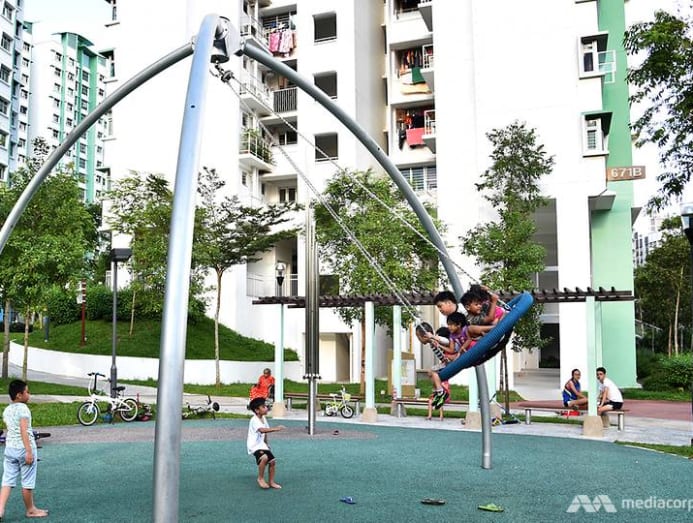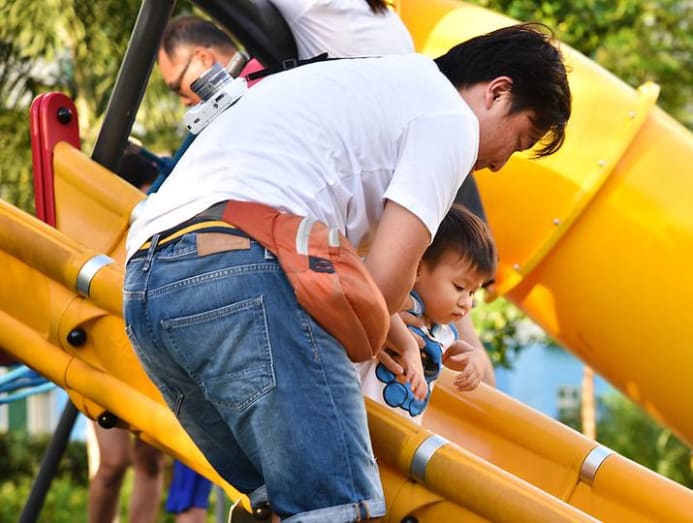commentary Singapore
Commentary: Smaller families in Singapore, leading to unhealthy parenting styles
Smaller families are changing the dynamics and styles of parenting in Singapore, argues Foo Koong Hean.

Children playing along East Coast Park. (Photo: Edric Sng)
SINGAPORE: It really didn’t seem that long ago when the Stop at Two campaign was in full swing, warning parents in Singapore that “the more you have, the less they (each) get”.
Yet, the challenge today isn’t to discourage families from having many children, but to coax or even cajole young Singaporeans to get married earlier and have them.
Compared to a few decades before, family sizes are shrinking as new parents tend to have less children.
Couples satisfy themselves with one or two kids being the norm, and three the exception.
These days, the sex of the child is also of lesser importance. While Singaporeans traditionally prefer a boy to continue the family’s lineage, it seems more couples are waking up to the trend that daughters make more caring, homely and reliable caregivers in their old age.
Family dynamics are also shifting, as families get smaller. Where it was commonplace to find large families with three generations living under one roof, most couples move out from their parents’ permanently after getting married, consequently resulting in just two generations living under the same roof.
Where older brothers and sisters would look after their young siblings in the past, and act as surrogate parents in households where both the father and mother have to work, children these days are growing up on their own, requiring active intervention from their parents.
While each child has a bigger slice of the family pie compared to past family structures, smaller families also mean that sibling rivalry is less intense, with greater resources and support from parents available for each child.

MENTALITY OF ENTITLEMENT AMONG CHILDREN IN SMALLER FAMILIES
While what makes for good parenting depends on a confluence of factors, including the temperament of children and the parents’ personalities and values, there seems to be a prevailing trend that emerges as family sizes decrease.
It seems that in large families with many children, where competition for resources and the attention of parents prevail, children exercise strong filial piety with their parents, showering them with love, attention and all forms of help, even when they grow older and have families of their own.
But in smaller families where a couple has only one or two children, parents instead shower their children with the same love, attention and forms of help – a form of “filial parenting”. They splurge on their few children to try to help them succeed in life.
While many do so because of their ability to devote significant resources to their one or two children, some spend on their children in the hopes of reciprocity, of being cared for in their old age.
Those who shower love and affection excessively, unknowingly nurture an unhealthy symbiotic relationship between parent and child.
This dependency of a child on the parent is sometimes subconsciously welcomed, often by a housewife who doesn’t mind the added attention from her child to stave off boredom, or a parent who works long hours with little time for the child and relishes feeling needed or useful.

Yet, in many cases, children of small families, because of the love, affection and resources they get easy access to, grow used to this outpouring from their parents, and may come to adopt an entitlement mentality.
Instead of feelings of gratitude, many grow to lack empathy for their parents.
Because they have grown accustomed to their parents’ swooping in to help or protect them, and constant intervention to smoothen their paths out, they also never really learn how to deal with difficult situations and miss out on important opportunities for self-development and self-awareness.
So these children grow up sheltered from the hardships of life and cared for extensively by their parents or a domestic helper. Because they have had it easy, this consequently makes it difficult for them to handle harsh hands that life may deal them.
It is not uncommon to see a parent chasing helplessly after their five-year-old child in a busy restaurant, in order to feed him or her tenderly home-cooked porridge. The parent pleads with the child to eat and to be careful not to knock into unsuspecting waiters carrying large trays of hot food, to no avail.
The child laughs and dodges attempts to be fed. Encouraged by the parent’s frazzled outburst, the child gives a “catch me if you can” taunt before scampering away.
Other customers frown, for who is the adult who should command respect and obedience from the other in the relationship is not clear.
NEGOTIATE FOR AND WITH CHILDREN
To be fair, parenting is one of the most challenging tasks a human being has to manage – for it is a life-long commitment.
It is fairly easy to foul up with impressionable young children, and it requires both parents to be on the same page on how to manage a child.
In a world of smaller families, the biggest risk parents run in my opinion is in excessively giving in and mollycoddling their children. Many wrap their children up in cocoons of protection, instead of dishing out hard truths - in turn, denying their children opportunities to think independently, reason and take action that is in their own best interests.

In my opinion, parents in small families need to apply a negotiation style of parenting to nurture independent, caring individuals. Parents must negotiate for the child in his or her early years when self-awareness and reasoning functions are not yet present.
They also have to nurture and negotiate with the child as soon as he or she is able to think. A child’s brain is only a third of its full adult size. It has to be developed, guided and “pruned” for it to work best.
So parents have a duty to nurture their child’s critical thinking skills from a young age, so that he or she learns how to lead a fulfilling life that contributes back to the family and society at large.
An individual’s purpose in life can only be realised through first establishing self-awareness including a full appreciation of right and wrong behavior, and this education process starts from young.
Parents must also imbue in their child the ability to negotiate, to look at issues from multiple perspectives and weigh the value of each.
They must also imbue in their child a desire to improve relationships with people close to them, a sense of curiosity about the world, and a hunger to make it a better place. They must ingrain in their child fundamental virtues and values that will shape their decisions in the future.
This is a parent’s sacred duty, on top of providing their child with nutrition and exposing them to good amounts of physical activity that aids in their growth.
Only then, can our children grow up to be contributing members of society who can think analytically, and build constructive relationships with those around them.
And maybe one of the first practical things a parent can teach a child on how to be a useful member of society is to teach them how to sit down and eat their food, instead of scampering around during dinner time.
Wouldn’t that be a low-hanging fruit?
Dr Foo Koong Hean is a senior consultant psychologist at the School of Positive Psychology and a senior lecturer in psychology at the James Cook University in Singapore.





